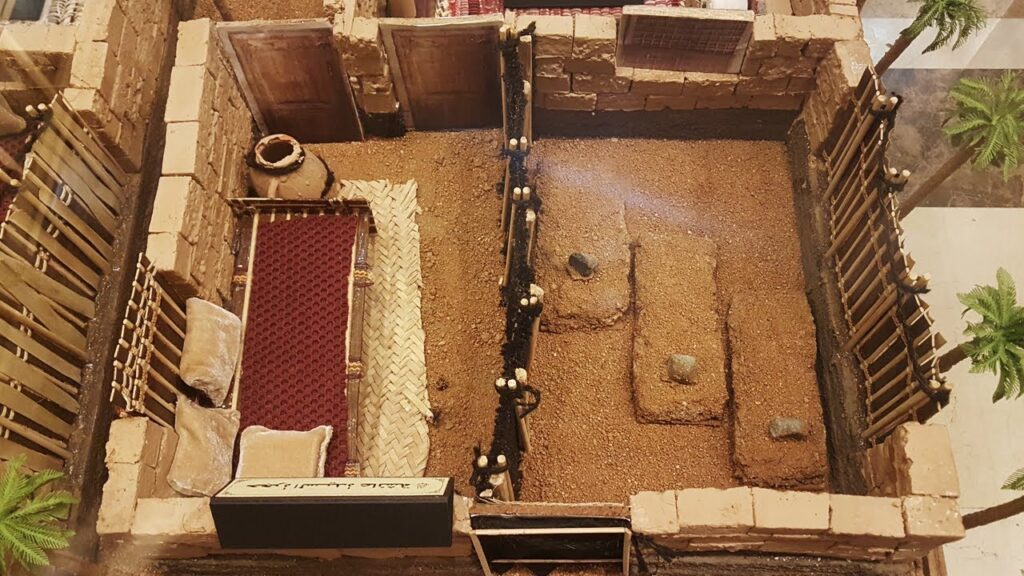
performing nawaafil at home
It is better to perform the nawaafil in the home. It has been mentioned in many narrations that Sayyidina Rasulullah Sallallahu ‘Alayhi Wasallam exhorted one to perform these at home and did so himself.
Many benefits are derived from this devotion.
Among these are that barakah of salaah the home becomes fulled with barakah and nur.
The memebers of the household will learn the salaah, and will gain the courage to perform these. Sayyidina Rasulullah Sallallahu ‘Alayhi Wasallam had commanded in a few ahaadith that “perform part of the prayers in the home.
Do not make it a cemetery”.i.e. Do not make the house like a cemetery where salaah is not
performed, or like the dead who do not perform the prayer.
Do not make the house in this manner a resemblance of a graveyard.
The author has mentioned only one hadith in this chapter.
hadith1 in performing nawaafil
‘Abdullah bin sa’d Radiyallahu ‘Anhu says: “I enquired from Rasulullah Sallallahu ‘Alayhi
Wasallam, is it more meritorious to perform nafil salaah in the home or in the masjid?
Rasulullah Sallallahu ‘Aayhi Wasallam replied: ‘Do you observe that my house is so near the masjid (which does not make it difficult, or cause a hindrance in coming to the masjid, in spite of all this) I prefer to perform the salaah, besides the faraa-id, in my house, rather than in the masjid”.
Commentary
As the nawaafil are based on concealment, therefore it is better to perform it in the home, to
ensure complete concealment.
It keeps away from show and pretence.
But certainly, it is undesirable that the faraa-id etc.be concealed.
More ajr ( thawaab-reward) is gained by performing it in the masjid.
Included are also the rak’ahs performed after tawaaf of the Ka’bah, salaatut taraweeh etc.
Although the tarawee is not from the faraa-id it is a peculiar feature of Ramadhaan, and is masnun to perform in jamaa’ah (congregation).
Likewise is every salaah performed with jamaa’ah like salaah of kusuf (solar eclipse prayer), which are meant to be publicly declared.
Therefore it is desirable to perform these in the masjid.
the fasting of the prophet

The nafl saum (fast) of Sayyidina Rasulullah Sallallahu ‘Alayhi Wasallam is discussed here.
It was the noble practice of Sayyidina Rasulullah Sallallahu ‘Alayhi Wasallam to observe many siyaam (fasts).
At times he continually observed fasts for many days.
The virtues of fasting have been mentioned in many kitaabs.
In every command of Allah there are thousands of benefits and wisdom.
The human mind and lofty thinking cannot reach the wisdom of the All Wise Allah.
Every person can grasp the deeni and dunyawi (worldly) benefits of Allah’s commands only till where it can think loftily.
The wisdom of Allah is much higher than this.
In the manner that all other commandments are filled with thousands of benefits, likewise is the saum, a few of its benefits are apparent and self-evident, one of which is beneficence and sympathy.
One who remains hungry, can feel what a hungry person experiences.
The difficulties the hungry confront.
In such a state one creates a passion to help the hungry, and the feeling to help the poor is also sensed.
More than this, it subdues one’s animalistic passions and urges.
Many a time when these tendencies irritate a human, it results in degrading a human religiously as well as materially.
Maulana Rumi explains this in the following couplets:
‘This love which the people have today, is not the love which good people have.
This is a mischief to fill the stomach.
When the stomach is filled, then unlawful deeds come to mind.
And when the stomach is empty and full of hunger, then love and its kind are all forgotten’.
Therefore it is stated in the hadith: “The one who cannot get married, should observe many fasts, for this will subdue his carnal passions”.
A major benefit of saum is the great spiritual strength that is derived from it.
For this reason, in every religion and society there was a form of saum.
From among the truthful religions, since the time of Sayyidina Aadam ‘Alayhis Salaam, saum
has been prescribed.
The practices of the Ambiyaa ‘Alayhimus Salaam were different in this matter.
Sayyidina Nuh ‘Alayhis Salaam, always fasted for twelve months.
The practice of Sayyidina Daawud ‘Alayhis Salaam was to fast every alternate day.
Sayyidina ‘Eesa ‘Alayhis Salaam fasted every third day. In the same manner the Ambiyaa ‘Alayhimus Salaam had different practices.
The practice of Sayyidina Rasulullah Sallallahu ‘Alayhi Wasallam was unique in this respect.
Due to periodical benefits, it was his practice to fast on special and fixed days.
Besides this, at times for timely benefits he continuously fasted, and at times did not fast.
The reason is clear, that when saum is observed as an antidote or a medical cure the timely benefits, it will be necessary as is the principle of medicine to use less or more.
The author has given a few examples of the practices of Sayyidina Rasulullah Sallallahu ‘Alayhi Wasallam.
hadith 1 in the fasting

‘Abdullah bin Shaqeeq Radhiyallahu ‘Anhu reports: “I inquired from ‘Aayeshah Radhiyallahu
‘Anha regarding the (nafil) saum of Rasulullah Sallallahu ‘Alayhi Wasallam.
She replied: ‘At times Rasulullah Sallallahu ‘Alayhi Wasallam fasted countinuously.
We used to say, he will keep on fasting (this month).
At times he did not fast, till we began thinking he will not fast (that month).
Rasulullah Sallallahu ‘Alayhi Wasallam did not fast for a month after he came to Madinah, besides the fasts of Ramadhaan'”.
(In this manner, the passing of the whole month without fasting was not observed.
As mentioned in Abu Daawud. This practice of Sayyidina Rasulullah Sallallahu ‘Alayhi Wasallam will be mentioned in the commentary of hadith number three in detail).
hadith 2 in the fasting
Anas Radiyallahu ‘Anhu reports: “Someone was asked about the saum of Rasulullah Sallallahu
‘Alayhi Wasallam? He replied:
‘It was his noble habit to fast on different occasions.
In some months he fasted for so many days, that it was thought he would continue fasting.
In other months he did not fast, we thought he would not fast now.
It was also from his noble habits that if one wanted to observe Rasulullah Sallallahu ‘Alayhi Wasallam performed salaah at night, it was possible, and if one wanted to observe Rasulullah Sallallahu ‘Alayhi Wasallam sleep at night, this too was possible'”.
Commentary
The object here is that the noble habit of Sayyidina Rasulullah Sallallahu ‘Alayhi Wasallam was not to sleep the whole night, neither to remain awake the full night, but adopt a middle course, wherein the rights of the nafs were considered, and also the ‘ibaadaat were given its full importance.
Therefore it was possible to observe his sleep at night as he retired for a portion of the night, and also observed the salaah, as part of the night was devoted to prayers.
Some of the ‘ulama have given another explanation to this, that the noble habit of Sayyidina Rasulullah Sallallahu ‘Alayhi Wasallam varied in this respect.
At times he performed the nawaafil in the first portion of the night.
Sometimes in the middle portion of the night. At times in the last portion of the night.
Therefore, if one wanted to observe sleep or salaah at a special time of the night, this too was possible.
If one feels that one would like to observe the salaah of Sayyidina Rasulullah Sallallahu
‘Alayhi Wasallam at a certain part of the night, then this opportunity could also be obtained, and if one wished to observe the sleep at this time an opportunity could also be obtained at some time.
Sayyidina Rasulullah Sallallahu ‘Alayhi Wasallam would rotate the time spent in prayer to
every portion of the night on different days.
We understand two benefits of this.
The first is that the main object is worship, and man was created for this reason, resulting in attaining the pleasure of Allah.
On every portion of the night, at one time or another, the blessings will be obtained.
The second is, that when ‘Ibaadah (devotion) is confined to an appointed time, it becomes a sort of habit, then the taste and pleasantness of hardship does not remain.
When ‘ibaadah is performed at different times of the night it will not become a habit.
hadith 3 in the fasting

Ibn ‘Abbaas Radiyallahu ‘Anhu relates: “Rasulullah Sallallahu ‘Alayhi Wasallam fasted the major portion of the month at times, till we thought that he did not intend ending the fasts.
In some months he did not fast, we began to think he would not fast now.
Besides Ramadaan he did not fast for a full month”.
hadith 4 in the fasting
“Aayeshah Radiyallahu ‘Anha says: “I did not observe Rasulullah Sallallahu ‘Alayhi Wasallam
fast for more days in any month (excluding Ramadaan) other than Sha’baan.
He fasted for the major part of the month, and nearly fasted for the full month”.
hadith 5 in the fasting
‘Abdullah bin Mas’ud Radiyallahu ‘Anhu reports: “Rasulullah Sallallahu ‘Alayhi Wasallam fasted for three days at the beginning of every month, and he very seldom did not fast on Friday”.
Commentary
One has been persuaded in many ahaadith to observe saum for three days in every month.
The thawaab (reward) for every good deed is tenfold, therefore the fasting of three days will add up to the thawaab of thirty days.
In this manner it will be as if one has fasted for one’s whole life.
Many ahaadith have been mentioned regarding the fixing of the three days.
There are no differences in this. At times on every Monday and Thursday.
Sometimes on the thirteenth, fourteenth and fifteenth.
In the same way he fasted at other times too.
It is mentioned in an ensuing hadith by Sayyiditina ‘Aayeshah Radiyallahu ‘Anha that Sayyidina Rasulullah Sallallahu ‘Alayhi Wasallam did not fix special days for fasting.
Sayyidina Ibn ‘Abbaas Radiyallahu ‘Anhu says: ‘Rasulullah Sallallahu ‘Alayhi Wasallam did not omit the fasting of the ayyaami beed (13th, 14th and 15th day of the Islaamic lunar month) at home or while on his travels’.
The second point in the above hadith is the fasting on Fridays.
From this hadith it is found that the fast of Fridays were given importance, but in another hadith it has been prohibited to fast on friday only.
For this reason some of the ‘ulama, due to the above hadith are of the opinion that it is mustahab to fast on friday and some ‘ulama due to the hadith wherein it has been prohibited, are of the opinion that it is makruh to fast on friday only.
The Hanafis hold both opinions.
hadith 6 in the fasting

Aayeshah Radhiyallahu anha reports: “Rasulullah Sallallahu Alayhi wasallam (often) gave
importance to the fasting on Mondays and Thursdays”
In some narrations the reason for giving importance to these days are mentioned.
One reason will be mentioned in a hadith of Sayidina Abu Hurayrah Radhiyallahu anhu which follows in this chapter, that deeds are presented on these days.
In a narration in Sahih Muslim regarding Monday, it has been stated that “I was born on a Monday, the revealing of the Quran to me also began on a Monday”.
In one hadith it stated that “Allah Ta’alah forgives the sins of every Muslim (provided the rules apply) on Mondays and Thursdays”.
It is said regarding those two people who are on bad terms “hold the granting of their forgiveness till they reconcile among themselves”.
hadith 7 in the fasting
Abu Hurayrah Radhiyallahu anhu says: “Rasulullah sallallahu alayhi wasallam said: ‘Deeds are presented (before Allah subhanahu wata’allah) on Mondays and Thursdays.
I desire that my deeds be presented whilst I am fasting'”.
Commentary
Making it possible for these to be easily accepted. The question may arise regarding the
presenting of deeds.
The gist of a hadeeth mentioned in Sahih Muslim show that deeds are presented daily in the morning and evenings.
What is meant by the deeds being presented on Mondays and Thursday? The Muhaditheen sum both up in different ways.
The easiest is that the deeds of the day and night are presented in details twice a day.
The deeds of the night separately and the ones of the day separately.
On Mondays and Thursdays they are presented briefly.
The deeds of the whole year are summed up in Sha’baan and Laylatul Qadar and presented before Allah the Almighty.
One benefit among the many benefits of presenting the deeds repeatedly are that the honour of the pious are made evident before the angels.
The angels raised a question when Allah Ta’aala created humans, that ‘You are creating such a being that will spread bloodshed and turmoil in the world’.
Allah Ta’aala knows at every moment the deeds committed by every person, therefore it is not necessary that deeds be presented to Him.
hadith 8 in the fasting
‘Aayeshah Radiyallahu ‘Anha reports: “Rasulullah Sallallahu ‘Alayhi Wasallam fasted three days of every month.
In some months he fasted on Saturdays, Sundays and Mondays, and in some months he fasted on Tuesdays, Wednesdays and Thursdays”.
Commentary
So that in this manner all the days of the week are covered.
The days of Friday were intentionally omitted as stated in some ahaadith that this day had been proclaimed as an ‘Eid.
Other important matters were fulfilled on this day. Or Friday has not been mentioned in this narration and may have been mentioned in other narrations.
hadith 9 in the fasting

Mu’aadhah Radiyallahu ‘Anha says. “I inquired from ‘Aayeshah Radiyallahu ‘Anha, did
Rasulullah Sallallahu ‘Alayhi Wasallam fast for three days of every month?” She replied: “Yes”.
I then asked: “On which days of the month did he fast”. She replied. “He did not fast on specific days, but whenever suitable”.
Commentary
At certain times it was the practice of Sayyidina Rasulullah Sallallahu ‘Alayhi Wasallam not to give importance to fixing certain days.
At times he fixed certain days.
For example, fasting on the first three days of the month, or sometimes on the last three days of the month, or in some months on Saturday, Sunday and Monday, and in another month on Tuesdays, Wednesdays and Thursdays.
Therefore different ahaadith have been narrated on this subject, and Sayyiditina ‘Aayeshah ,Radhiyallahu ‘Anha refused to specify a certain day.
hadith 10 in the fasting
Aayeshah Radiyallahu ‘Anha reports: “The Quraysh observed the fast of ‘Aa-shura in the days of jaahiliyyah (pre-Islaarnic period of ignorance).
Rasulullah Sallallahu ‘Alayhi Wasallam also observed this fast (before the hijrah as a nafl).
(After the hijrah) when he came to Madinah Munawwarah he observed these and commanded the ummah also to observe it.
When the command to fast in Ramadaan was revealed, it was proclaimed fard, and the fast of ‘Aa-shura became nafl.
Those who wished, observed them (‘Aa-shura) and those who did not, omitted them.
Commentary
Many narrations have been narrated on the virtues of the saum (fast) of ‘Aa-shura.
It is stated in a narration in Sahih Muslim that by observing the saum of ‘Arafah the sins of two years are forgiven, and by observing the fast of ‘Aa-shura the sins of one year are forgiven.
Some commentators write that on the day of ‘Aa-shura, the taubah (repentance) of Sayyidina Aadam ‘Alayhis Salaam was accepted;
The boat of Sayyidina Nuh ‘Alayhis Salaam docked (after the great floods); Sayyidina Musa ‘Alayhis Salaam was saved from Firown, and Firown drowned on this day;
Sayyidina ‘Eesa ‘Alayhis Salaam was born, and raised to the heavens on this day; On this day Sayyidina Yunus ‘Alayhis Salaam was freed from the stomach of the fish, and his ummah forgiven;
On this day Sayyidina Yusuf ‘Alayhis Salaam was taken out of the well; On this day Sayyidina Ayyub ‘Alayhis Salaam was cured from his illness; On this day Sayyidina Idriss ‘Alayhis Salaam was raised to the sky;
On this day Sayyidina Ebrahim ‘Alayhis Salaam was born; On this day Sayyidina Sulaymaan ‘Alayhis Salaam was given the powers to rule a country; Besides these many other karaamaat (miracles) are mentioned in the commentaries of the ahaadith and books on seerah.
Although according to the muhadditheen many questions have been raised on these incidents, there are numerous miracles that have been ascertained.
It is said that the wild animals also fast on this day. Allahu Akbar! What a blessed day this is? Yet we waste it in amusements and useless pastimes.
Probably it is from among these reasons that, the virtues of this day was well known in the days of jaahiliyyah.
Therefore the Quraysh must have observed this fast before the advent of Islaam.
When Sayidina Rasulullah Sallallahu ‘Alayhi Wasallam came to Madinah Munawwarah, he observed that the Jews, who are from the AhlulKitaab, also observing the fast of Aa-shurah.
Sayidina Rasulullah Sallallahu ‘Alayhi Wasallam inquired from them the reason for fasting on this day.
They replied: ‘Allah Ta’alah saved Musa Alayhis salaam on this day from the oppression of Firown (Pharaoh) and also Firown was drowned on this day.
In gratitude and happiness Musa Alayhis salaam fasted on this day’.
Sayidina Rasulullah Sallallahu ‘Alayhi Wasallam replied: “We are more entitled than you to
follow Musa Alayhis Salaam”.
Therefore, Sayidina Rasulullah Sallallahu ‘Alayhi Wasallam himself fasted on this day and commanded the Ummah also to fast on this day.
This incident is mentioned in the Sahih Muslim.
For this reason the Hanafis say this saum (fast) was fard before the command of Ramadhaan was revealed.
When the fast of Ramadhaan was ordained these were abrogated.
Its merits and the virtues for the forgiveness of one years sins still remain.
MAS-ALAH: The original day for the observance of the fast of Aa-shurah is the tenth.
In the early periods of Islaam, Sayidina Rasulullah Sallallahu ‘Alayhi Wasallam was in agreement with the ahlul-kitaab, as their belief was also from the heavenly revealed religions, and was better than the religion of the mushriqeen, but in the later years the ahlul-kitaab were also opposed in words and deeds, which was necessary due to many factors.
Once a sahabi brought this to the notice of Sayidina Rasulullah Sallallahu ‘Alayhi Wasallam were upon he replied:
“If I remain alive next year I will surely fast on the ninth next year”.
In another narration it is stated: “Oppose the Jews, observe the fast of the ninth or eleventh” i.e. add a fast to that of the tenth.
With this no resemblance or imitation will remain. Therefore, it is advisable not to observe the fast of the tenth only, it is preferable that the fast of the ninth be also added to it, so that one will be fulfilling the commands of both hadith. If the ninth could not be observed then the eleventh should be added.
hadith 11 in the fasting
‘Aayeshah Radiyallahu ‘Anha says: “Rasulullah Sallallahu ‘Alayhi Wasallam once came home, a woman was present at that time.
Rasulullah Sallallahu ‘Alayhi Wasallam inquired.
‘Who is this woman?’ I replied: ‘This is a certain woman who does not sleep at night’.
Rasulullah Sallallahu ‘Alayhi Wasallam said: ‘One should observe only that amount of nawaafil which one can bear.
I swear an oath that Allah Ta’aala does not fear the granting of rewards, till you begin to fear the observance of deeds’. ‘Aayeshah Radiyallahu.
‘Anha says: ‘The most beloved deed of Rasulullah Sallallahu ‘Alayhi Wasallam were those that were practised continuously.
Commentary
This Sahaabiyyah was Sayyiditina Kholaa bint Tuwayt bin Habib Radiyallahu ‘Anha.
She had the fervour and intense desire to perform ‘ibaadah.
Many incidents of this type are mentioned in the ahaadith, Where the zeal of the Sahaabah Radiyallahu ‘Anhu was so intense, it compelled them to perform ‘ibaadah more than normal.
Sayyidina Rasulullah Sallallahu ‘Alayhi Wasallam advised them to observe moderation.
Sayyidina ‘Abdullah bin ‘Amr ibnul ‘Aas Radiyallahu ‘Anhu, a famous Sahaabi says: “I once made up my mind, that I would strive to intensify my devotions.
I would always fast during the day. I would complete the recitation of the whole Quran (khatm) every night. My father got me married to a honourable woman.
Once my father inquired from my wife about my state of affairs? She replied: ‘He is very pious man, he does not come to bed the whole night.
He does not have anything to do with anyone’.
My father became very angry with me, that I had got you married to an honourable woman, and you have left her hanging.
Due to my intense desire for devotions this did not effect me.
My father complained to Rasulullah Sallallahu Alayhi Wasallam about my state of affairs.
Rasulullah Sallallahu Alayhi Wasallam asked me: ‘I have heard you always fats during the day, and stand in prayer the whole night?’ I replied: ‘yes’.
Rasulullah Sallallahu Alayhi Wasallam said: ‘Do not do so, but fast sometimes, and abstain sometimes. In the same manner do perform salaah at night, and sleep too.
Your body also has a right on you. Your eyes also have a right on you, it will become weak due to staying awake the whole night.
Your wife also has a right on you.
Your children also have a right on you. Those who meet you also have a right on you'”.
hadith 12 in the fasting
Abu Salih R.A. reports “I enquired from Aayeshah and Ummi Salamah Radhiyallahu anhuma
that which act was the most beloved by Rasulullah Sallallahu Alayhi Wasallam?”
Both gave the reply “That deed which was practised continuously, even if it was a little”.
for prophets stories visit https://sunofislam.com/prophetsofgod/
for scientific miracles articles visit www.sunofislam.com
